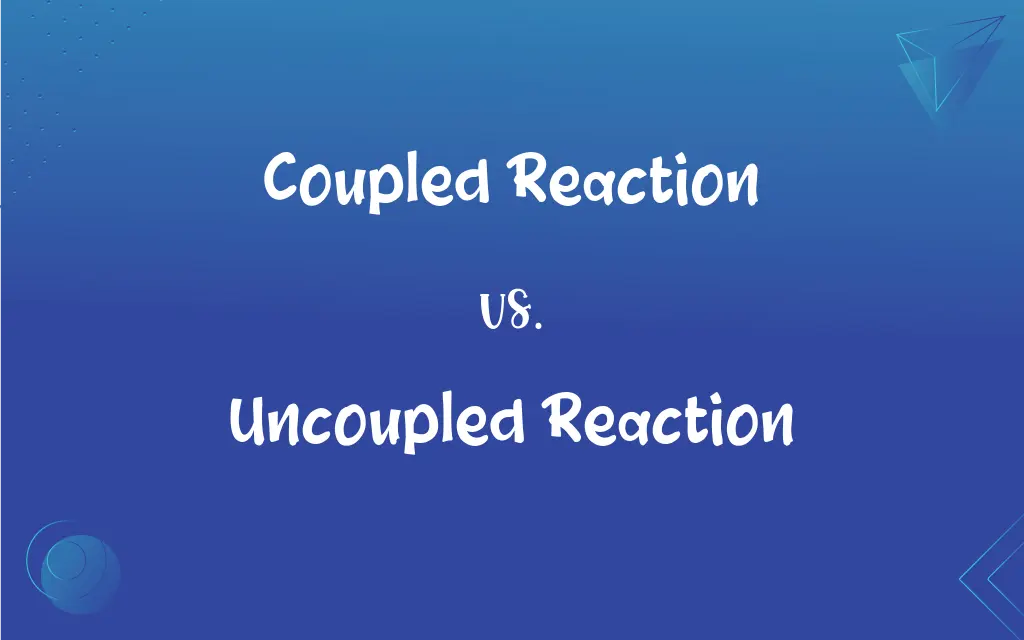Coupled Reaction vs. Uncoupled Reaction: What's the Difference?
Edited by Aimie Carlson || By Harlon Moss || Published on September 18, 2024
Coupled reactions involve linking an energetically unfavorable process with a favorable one, while uncoupled reactions proceed independently, each based on its own energy profile.

Key Differences
Coupled reactions facilitate processes that would otherwise be energetically unfavorable by pairing them with favorable ones, ensuring overall progress. Uncoupled reactions, in contrast, operate independently, with each reaction's feasibility determined solely by its own energetics. In biological systems, coupled reactions are essential for synthesizing complex molecules and maintaining cellular functions, whereas uncoupled reactions might serve more straightforward, often catabolic, roles.
The efficiency of energy transfer and utilization distinguishes coupled from uncoupled reactions. Coupled reactions effectively use the energy released from one process to drive another, optimizing energy usage within a system. Uncoupled reactions, lacking this interdependence, may not always use energy as efficiently, potentially leading to energy dissipation as heat or other forms.
Coupled reactions are often regulated and highly controlled within biological systems to ensure precise outcomes, such as ATP synthesis being driven by proton gradients in mitochondria. Uncoupled reactions, however, may occur more spontaneously, subject to basic chemical kinetics and equilibrium considerations without the necessity for tight regulatory mechanisms.
Environmental conditions can influence both coupled and uncoupled reactions, but the impact is more pronounced in coupled processes, where the efficiency of energy transfer between reactions can vary significantly with changes in conditions. Uncoupled reactions, being independent, are less affected by the status of unrelated processes, responding more directly to changes in their own specific conditions.
Comparison Chart
Definition
Link an unfavorable reaction with a favorable one to proceed
Proceed independently, based on their own energetics
ADVERTISEMENT
Energy Efficiency
High, as energy from one reaction drives another
Variable, depending on individual reaction energetics
Regulation
Typically tightly regulated within biological systems
Less regulated, more spontaneous
Example
ATP synthesis driven by proton gradients
Hydrolysis of sucrose into glucose and fructose
Dependence on Environmental Conditions
More sensitive, as efficiency depends on optimal coupling
Less sensitive, primarily affected by own reaction conditions
Coupled Reaction and Uncoupled Reaction Definitions
Coupled Reaction
Biological significance.
Muscle contraction is powered by ATP hydrolysis, a classic example of a coupled reaction.
ADVERTISEMENT
Uncoupled Reaction
Less regulated.
Many uncoupled reactions, such as combustion, occur without the need for biological catalysts.
Coupled Reaction
Efficiency in energy use.
Cellular respiration couples the exergonic breakdown of glucose with the endergonic synthesis of ATP.
Uncoupled Reaction
Spontaneous processes.
The dissolution of salt in water is an uncoupled reaction, driven by the entropy increase.
Coupled Reaction
Regulated processes.
Enzymes like kinases often mediate coupled reactions, ensuring precise control over biochemical pathways.
Uncoupled Reaction
Variable energy efficiency.
Exothermic uncoupled reactions like combustion release energy, but not necessarily in a useful form.
Coupled Reaction
Energy linkage.
The synthesis of glucose-6-phosphate is energetically unfavorable but proceeds when coupled with ATP hydrolysis.
Uncoupled Reaction
Independent energetics.
The decomposition of hydrogen peroxide into water and oxygen proceeds based solely on its own energy release.
Coupled Reaction
Dependency on conditions.
The efficiency of oxidative phosphorylation can vary with the proton gradient across the mitochondrial membrane.
Uncoupled Reaction
Stable under varying conditions.
The rate of a simple uncoupled reaction like acid-base neutralization is consistent across a range of temperatures.
FAQs
What defines a coupled reaction?
A coupled reaction involves linking an energetically unfavorable process with a favorable one to proceed.
Why are coupled reactions important in biology?
They allow the synthesis of vital molecules and the maintenance of cellular functions that wouldn't be possible through uncoupled reactions alone.
How do coupled reactions contribute to energy efficiency?
They harness the energy from exergonic reactions to drive endergonic processes, optimizing the system's overall energy use.
What role do enzymes play in coupled reactions?
Enzymes often mediate coupled reactions, ensuring that they proceed under controlled conditions and with high specificity.
How do uncoupled reactions operate?
Uncoupled reactions proceed independently, each based on its own inherent energetics.
How do environmental conditions affect coupled reactions?
The efficiency of energy transfer in coupled reactions can vary with conditions, such as temperature or pH, affecting the overall process.
How does the regulation of coupled reactions impact organism function?
Tight regulation ensures that energy is used effectively and that biochemical pathways are coordinated for optimal functioning.
Can uncoupled reactions be part of biological systems?
Yes, uncoupled reactions occur in biological systems, often serving catabolic or other straightforward roles.
Are uncoupled reactions always less efficient than coupled ones?
Not necessarily; efficiency depends on the context and how the energy released is utilized, but coupled reactions generally optimize energy use better.
Can an uncoupled reaction become coupled?
Yes, through biochemical pathways, what appears as an uncoupled reaction can be part of a larger coupled process.
What is a common example of an uncoupled reaction in daily life?
Combustion, such as burning wood or fossil fuels, is an uncoupled reaction that releases energy as heat and light.
Can uncoupled reactions be useful in industrial processes?
Yes, uncoupled reactions like combustion are fundamental to energy production and various manufacturing processes.
What determines the directionality of coupled reactions?
The overall Gibbs free energy change of the coupled processes determines whether the reaction will proceed spontaneously.
Do uncoupled reactions always release energy?
Many do, especially if they are exothermic, but some uncoupled reactions may require energy input, depending on their nature.
Are all biological reactions coupled?
No, biological systems contain both coupled and uncoupled reactions, each serving different roles and functions.
How is ATP synthesis an example of a coupled reaction?
ATP synthesis in mitochondria is driven by the energy released from the electron transport chain, a prime example of coupling in cellular respiration.
How can the coupling of reactions be experimentally determined?
By measuring changes in energy levels, reaction rates, and the influence of various conditions on the reaction pathway.
Are coupled reactions reversible?
Yes, like all chemical reactions, they can be reversible under certain conditions, though the directionality is determined by energetics and regulation.
What is an example of a coupled reaction in metabolism?
The use of ATP hydrolysis to drive unfavorable reactions like the synthesis of macromolecules is a key metabolic coupled reaction.
What happens if a coupled reaction is disrupted?
Disruption can lead to inefficiencies or failures in the process, potentially impacting cellular functions or industrial applications.
About Author
Written by
Harlon MossHarlon is a seasoned quality moderator and accomplished content writer for Difference Wiki. An alumnus of the prestigious University of California, he earned his degree in Computer Science. Leveraging his academic background, Harlon brings a meticulous and informed perspective to his work, ensuring content accuracy and excellence.
Edited by
Aimie CarlsonAimie Carlson, holding a master's degree in English literature, is a fervent English language enthusiast. She lends her writing talents to Difference Wiki, a prominent website that specializes in comparisons, offering readers insightful analyses that both captivate and inform.






































































